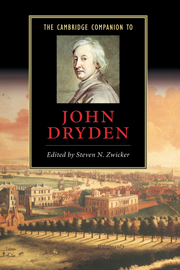Book contents
- Frontmatter
- Part 1 Pleasures of the imagination
- Part 2 A literary life in Restoration England
- Part 3 Courting and complying with danger
- 11 Dryden and patronage
- 12 Dryden and political allegiance
- 13 The piety of John Dryden
- 14 Dryden’s Fables and the judgment of art
- 15 Dryden and the problem of literary modernity
- Further reading
- Index
- Series List
12 - Dryden and political allegiance
from Part 3 - Courting and complying with danger
Published online by Cambridge University Press: 28 May 2006
- Frontmatter
- Part 1 Pleasures of the imagination
- Part 2 A literary life in Restoration England
- Part 3 Courting and complying with danger
- 11 Dryden and patronage
- 12 Dryden and political allegiance
- 13 The piety of John Dryden
- 14 Dryden’s Fables and the judgment of art
- 15 Dryden and the problem of literary modernity
- Further reading
- Index
- Series List
Summary
The facts are these: Dryden opened his career as a writer by defining himself as a supporter of Oliver Cromwell, in a volume of poems honoring the Protector after his death in September 1658. A short time later, he reappeared on the literary scene as a celebrant of the Restoration. At the time of the Second Dutch War, when the first enthusiasm for Charles II had been considerably tarnished by events and his own behavior, Dryden came to the king's defense indirectly. By 1672, however, in expectation of the Third Dutch War, Dryden could be seen in print as a devoted servant of James, Duke of York, a loyalty he retained long past the point where it ceased to be helpful to him. After the Glorious Revolution, and the arrival of William III, Dryden remained a Jacobite, refusing to dedicate his great translation of Virgil to the new king.
The facts have involved generations of Dryden commentators in an evaluative struggle over whether Dryden was a turn-coat, a time-server, or a man who finally found the leader whose laureate he could sincerely be, in good fortune and bad. The point of this chapter is not, however, to renew the old arguments about principle versus interest, conviction versus prudential adaptability, which can never be resolved to the satisfaction of all of Dryden’s readers, who are not themselves unbiased. I begin instead with the observation that it was scarcely necessary for Dryden to advertise his political allegiances, and their shifts, in such a definitive way. Having done it once, however, he had to keep doing it. History, having pushed him into the public sphere, would change its own direction so many times during his lifetime that he was constantly playing catch-up. Secondly, I want to reconsider the relation between Dryden’s positioning of himself on the political spectrum, and his theories of language and genre. One could see this two ways. Having to restate his allegiances meant having to recast his literary theory so that it seemed to support, if not to require, the larger political change. Alternatively, one could argue a more bizarre thesis: that the literary theory, and the ambitions behind it, drove the political affiliations.
- Type
- Chapter
- Information
- The Cambridge Companion to John Dryden , pp. 221 - 236Publisher: Cambridge University PressPrint publication year: 2004



